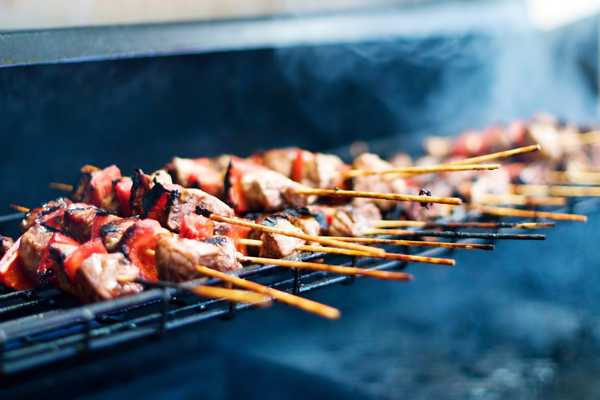The diet in Buenos Aires is very meat-heavy, especially beef! The country is well known for its steak, and this will no doubt be high on the list of most visitors come meal-times. But that’s not all you can munch on in Buenos Aires. Thanks to waves of immigration from the Mediterranean, you will find dishes inspired by Spanish and Italian cuisine feature prominently in the restaurants, cafés and markets of Argentina’s ornate capital.
- 1
Asado
A banquet of beef

- Food
Argentine asado needs no introduction, but just in case you've never heard of it, imagine world-class meat cuts salted and grilled to perfection. The ritual of asado begins with a serving of offals, such as sweetbread and kidneys, which are eaten while the main cuts finish cooking.
Once done, you’ll be presented with a choice of ribs, sirloin and tenderloin, among other cuts. The side dish is usually salad, though some restaurants offer French fries as well. Asado is a tradition and a ritual, shared by Argentine families on Sundays and by Argentine friends… whenever possible, actually. Argentines love asado and any time is the right time for having it.
- 2
Milanesa de carne
Deep fried goodness

- Food
It’s no secret Argentines love meat. The country eats over 100 kg per person per year, and much of that in the form of milanesas. This traditional, inexpensive and delicious dish consists of round steak coated in breadcrumbs. Whisked eggs are used to make the breadcrumbs stick to the meat. They are usually fried and topped with mozzarella, though most restaurants offer at least 3 topping choices. The locals’ favorite? Milanesa a caballo (horse-riding milanesa), topped with fried eggs and served with a side of French fries.
photo by pier (CC BY-SA 4.0) modified
- 3
Empanadas
Tasty pastries

- Food
Simply put, empanadas are disks of puff pastry folded and filled with a variety of fillings. The most popular are meat, ham and cheese, and humita (a sweetcorn filling typical from the north-west of Argentina), though you’ll find different flavors if you visit the provinces.
Empanadas can be fried or baked, and they are the perfect finger food for you to grab while you wander around Buenos Aires. Fun fact: Pasteles are similar to empanadas but they’re bigger, fried and sugar-coated.
- 4
Locro
South American Stew

- Food
Arising from humble origins, locro is now commonly prepared and eaten on national holidays such as 25 de Mayo and 9 de Julio. This calorific and flavor-packed stew is made with an assortment of beans, corn and sausages, among other vegetables and meat cuts. It is usually spicy and thick, with a characteristic yellow-red color. You can often find this dish in small cozy restaurants serving traditional cuisine in Buenos Aires.
photo by Stevage (CC BY-SA 4.0) modified
- 5
Choripán
Argentine-style sausage sandwich

- Food
Choripán is short for “chorizo” (pork sausage) and “pan” (bread). This pork sausage sandwich is a national favorite, and variations span from the classic “chori” (with mayo or mustard) to the gourmet kind which incorporates avocado, arugula and dried tomatoes, among other ingredients.
Choripán is usually homemade, eaten before asado or on its own, or bought at food trucks. Its taste is salty and greasy, and simply delicious. Fun fact: According to popular wisdom, the best choris you’ll ever have are the ones you buy from the food truck right outside the stadium, after watching a soccer match.
- 6
Arroz con leche
Classic rice pudding

- Food
The rice is slowly cooked in milk, cinnamon and vanilla until it achieves a creamy, slightly sweet consistency. It is cheap and easy to make, and can be eaten either cold or warm.
This traditional dessert dates from colonial times, though nowadays you can find an industrialized version of it in most supermarkets, with different flavors such as chocolate, cinnamon and dulce de leche.
Fun fact: Arroz con leche is also the name of a typical Argentine nursery rhyme.
photo by Eli123seo (CC BY-SA 4.0) modified
- 7
Pastelitos
Sickly sweet jam pastries

- Food
A typical pastry you can find in many bakeries as well as on the street, commonly eaten on national holidays for dessert or as an afternoon snack.
A pastelito is a square piece of quince jam (or sweet potato jam) covered in layers upon layers of puff pastry, covered with sugar syrup. Make sure you have a drink at the ready nearby, as you may find the taste a bit sickly sweet.
photo by Julio Sifontes (CC BY-SA 3.0) modified
- 8
Dulce de leche
A milky caramel family favorite

- Food
Similar in color and taste to caramel, the main ingredient of this dessert is milk, slowly cooked with sugar until it reaches a thick, dark-brown consistency. The perfect Argentine comfort food, dulce de leche can be eaten on its own or as an ingredient in snacks and other desserts, as it’s a popular filling, topping and ice cream flavor.
Fun fact: Dulce de leche is usually combined with other flavors such as chocolate, coconut and banana.
- 9
Alfajores
Perfect for an afternoon snack

- Food
The basic alfajor is made up of 2 round biscuits, joined together with dulce de leche and covered in chocolate. They can be doubles (2 biscuits) or triples (3 biscuits, double filling). You’ll find alfajores in every sweet shop, supermarket and corner shop, all throughout the country. Alfajores are also considered a regional delicacy in some provinces, where they’re made following a slightly different recipe, such as with fruit jam as filling.
Fun fact: Whenever Argentines travel in their country, it’s very common to bring back home a box of alfajores as a souvenir.
photo by קרלוס הגדול (CC BY-SA 3.0) modified
- 10
Mate
Argentina’s national drink, pronounced “mah-the”

- Food
Mate is an infusion of yerba mate dried leaves (commonly known as yerba) and hot water, though it can include orange peelings or peppermint to add flavor. It’s prepared and drunk in a cup (also called mate) through a metal straw called a bombilla.
Argentines drink mate at any time, either alone or with friends and family, as the mate stands for friendship and companionship. Much like asado, it’s a ritual and a cultural symbol, and something you should definitely try when you come to visit. The origins of mate date back from pre-hispanic times, when the guaraní tribe drank the leaves of yerba mate with water from inside a hollowed squash.


















